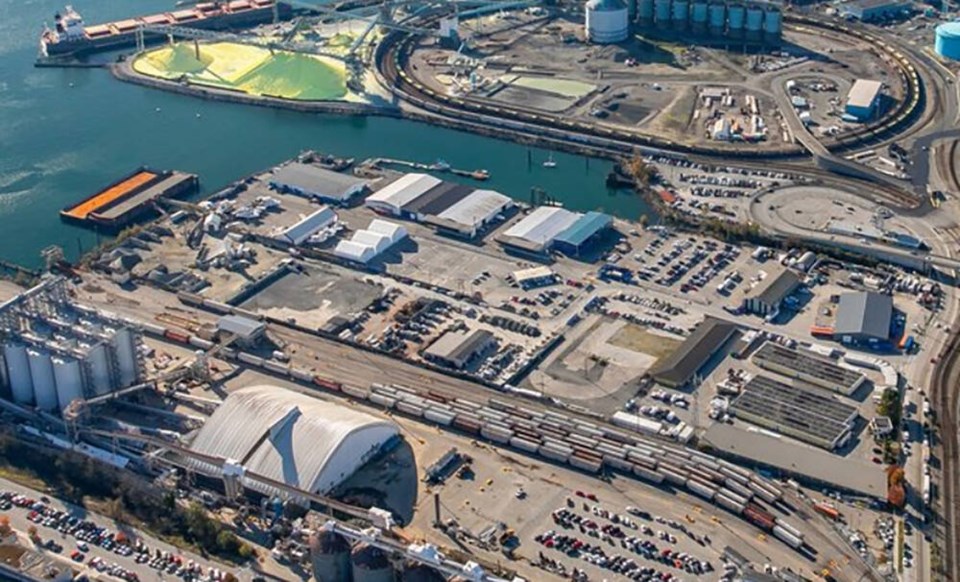A major piece of industrial waterfront property has changed hands on the North Shore.
Wesbild Holdings Ltd. announced this week that it has sold the 27-acre North Vancouver parcel at 1371 McKeen Ave. to an institutional investor, which industry sources are identifying as Dream Summit Industrial LP of Toronto.
Wesbild bought the property in 2017 for $115 million. Since then, the company made improvements to the self-storage facility and marina on the site, which it will continue to operate under a lease-back arrangement. But the developer’s biggest proposed changes for the land were rejected by the District of North Vancouver’s approving officer in 2019.
The company has sought to subdivide the northern 15 acres of the site into smaller lots accommodating various uses including film production, a food commissary, e-commerce, craft brewing and child care.
Wesbild said its vision would create between 500 and 1,000 jobs on the northern portion versus the eight positions in place at the time.
“We were initially trying to redevelop the site with industrial flex, much needed on the North Shore,” said Wesbild president and CEO Kevin Layden. “We had plans to build out industrial space that would have enabled more people to stay on the North Shore.… But if the district is not interested, they’re not interested. You can only go at it so many times.”
Layden said it was a frustration that fixing up the existing facilities and making the site into an outdoor storage facility was “the best we could do.”
“We just weren’t able to meet the hurdles that were being put in place,” he said. “It’s unfortunate with the shortage of industrial space on the North Shore we couldn’t do what we originally planned, but Plan B worked out fine.”
In an interview, Dan Milburn, the district’s general manager of planning, said he stands by the 2019 decision. Even though the property has never been used as an export terminal, the district’s planning recognizes that as its best possible use. Heavy industrial land with tide access is only going to become more important in the future, he added.
“You’ve got access to the marine side and access to rail and it’s large, so it can handle the bulk movement of goods,” he said. “We know there’s not a lot of that kind of land left. We need to make sure that it’s protected for that purpose.… Certainly, I think the threat of tariffs in Canada justifies even more the importance of keeping lands that can help us move goods internationally.”
And, Milburn added, there is limited road, pedestrian or cycling access and no transit to the property, meaning the transportation network could not accommodate the numbers of commuters Wesbild’s business park-like proposal would generate.
“It could compromise the functioning of adjacent industrial uses in the port because of the amount of traffic and demand for services,” he said.
The purchase price was not disclosed, but Layden said it came in below the $6.6 million per acre HTEC paid last year for the Erco Worldwide chemical plant in the Maplewood industrial area. That deal ranked as the largest industrial land deal last year for both North Vancouver and the region.
“They did better than we did,” Layden said.
Layden said the buyer has acquired the property as an income-producing asset and will bide its time with respect to any future development.
Dream did not respond to a request for comment on the deal.
Milburn said he has not yet been contacted by the new owners of the property but, he added, the district’s position on how the land would best be used hasn’t changed.
“If they’re looking for other kinds of warehousing, manufacturing, port-related uses like the transshipment of goods, all of those things would be consistent with that vision,” he said. “It’s going to get supported.”
The same rationale is being echoed by the North Vancouver Chamber, which has closely watched the property for years.
Chamber CEO Patrick Stafford-Smith said he also worries that speculative investment that leads to new commercial, office or light-industrial uses also drives up the price of heavy industrial land that could otherwise play a much more important role in the bigger picture.
“North Vancouver is a significant part of the Canadian economy. That comes through our port here and we need to make sure it’s competitive worldwide so the businesses across the country can compete,” he said. “We’re competing worldwide with other jurisdictions who are able to move goods to and from that country on arguably cheaper land. Our port property lands need to be affordable for the large industrial uses and goods movement uses that they’re designated for.”
Tony Quattrin, vice-chair with the CBRE Ltd.’s National Investment Team in Vancouver, said the sale of 1371 McKeen indicates the establishment of industrial outdoor storage (IOS) as an asset class in its own right.
“There’s a number of large institutional investors around the globe showing interest in IOS, which offers land with future development potential, as well as current income,” he said in a statement. “With the limited amount of industrial land in Metro Vancouver, the investor here took a long-term view that it was a good investment for reasonably priced land supported by a strong holding income.”
[email protected]
twitter.com/brentrichter
brentrichter.bsky.social
Want to stay updated on North Vancouver and West Vancouver news? Sign up for our free daily newsletter.



